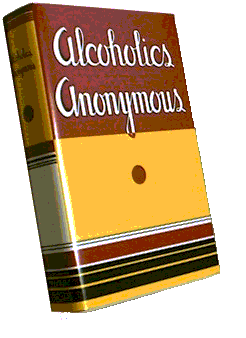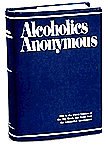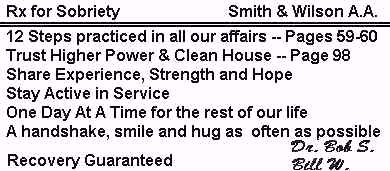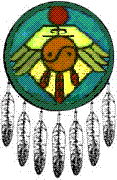

 Click The Images To Go To Page Indicated This article appeared in the April 1986 issue of Reader's Digest. The author of the article was the welcoming host at the 50th Anniversary International Convention of Alcoholics Anonymous held in Montreal, Canada.
and the "Bedtime Story" by Bob P. He has been called the greatest social architect of the 20th century. He called himself Bill W. As a securities analyst he made fortunes for himself and his clients. But he lost everything when he became a hopeless drunk. Then, the gift of a higher power, he found a road to recovery and helped create a unique fellowship that has brought hope and new life to millions around the world. I am part of that fellowship, and I was given the amazing grace to know this extraordinary man. Twenty-five year ago, doctors told me I was going to die -- soon -- if I didn't stop drinking. But I couldn't face reality without copious quantities of vodka, followed by beer chasers. As a young man, I had come to New York City from Kansas, carved out a career in public relations, married, had three children, and established a home in a fashionable Connecticut suburb. On the outside, I looked prosperous, but inside I was tormented by feelings of inadequacy. When I was 40, an enormous swelling was diagnosed as advanced cirrhosis of the liver. I had been getting purplish bruises all over my body and suffered nosebleeds -- all typical of this kind of liver damage. Once, on a business trip, I couldn't stop vomiting blood and lost half of all I had. My life was saved with transfusions. But I couldn't stop drinking, even after I had another hemorrhage. Finally, my physician gave up on me and sent me to Dr. Harry M. Tiebout, one of the few psychiatrists then practicing who were sympathetic toward Alcoholics Anonymous and who recognized alcoholism as a disease, not a character flaw. Tiebout suggested I go to A.A., but I was too far gone to quit drinking at that point, and so was committed to High Watch Farm in Kent, Conn. There I took the first of AA's 12 steps; I admitted I was powerless over alcohol, that my life had become unmanageable. On July 4, 1961, I joined the fellowship of A.A. and started a sober life. Three years later when I volunteered to help A.A. with public relations, I met Bill W. He was a legend, and I was nervous as I entered his Manhattan office. Bill was slouched in a chair, his feet up on a battered oak desk that was scarred with dozens of burn marks from cigarette stubs. When he stood he was about six feet, two inches -- slender and loose-limbed. He had a long face and sparkling blue eyes. He acted as if meeting me was the nicest thing that had happened to him in years. "I'm Bill," he said, stretching out his hand. "I'm a drunk." I started mumbling how I owed him my life, and Bill, embarrassed, looked at the floor and said, "Just pass it on." In time, I became a voluntary trustee of A.A. and came into regular contact with Bill W. At conferences and board meetings, I often watched him seek out newcomers off in a corner. He knew the loneliness, the shyness and the insecurity of the alcoholic. "I'm Bill," he'd greet them, just as he had me. "I'm a drunk" I never heard him use the word "alcoholic" when referring to himself. Bill acted and seemed like an ordinary man. But he was an extraordinary ordinary man. It didn"t take me long to realize that everybody who knew him had wonderful stories to tell about Bill and his wife, Lois, who co-founded Al-Anon for the families of alcoholic. But nobody had a better story to tell than Bill himself. He called it the "bedtime story." I heard it first in 1966 at the office Christmas party, but he had been telling it for years. We had gathered for fruit punch, cookies and carol-singing. Then, as people sat on desks and chairs, there was an expectant silence. Bill had been standing by the punch bowl. Now, with a slithering, corkscrew motion, he settled on the floor and started to talk. East Dorset, Vt., boasted fewer than 500 inhabitants when Bill W. was born there on November 26, 1895. He grew up in a home torn by arguments, which often led to Papa's going away for a few days. Bill felt that sense of some disaster lurking around the corner which many children of broken homes experience. It tormented him as he got older. When he was ten, his parents divorced and went their separate ways -- something almost unheard of in 1906. Bill was left with his maternal grandparents. To make up for his loneliness and feelings of inadequacy, Bill became an overcompensator. At age 12, he began to show drive, ambition, competitiveness. When his grandfather read a book about Australia and told Bill that only a native of that country could make a boomerang, Bill spent six months whittling until he arrived at one that worked. Later, he saw that boomerang as a curse -- because it proved to his ego that he had the tenacity and will to be "number one" at anything -- music, sports, science. For example, he fixed a broken fiddle and practiced until he played first violin in the school orchestra. He was not a jock by nature, but he drove himself and became captain of the baseball team. In nearby Manchester, a popular summer resort, Bill got to know Ebby Thatcher, from Albany. The two young men became lifelong friends. In 1913, two years after meeting Ebby, Bill met and fell in love with another summer visitor, a slim, dark-hared girl from a well-to-do Brooklyn, N.Y., family. Lois's love for Bill was as burning and constant as his for her, a love that was to survive the vicissitudes of all his years of alcoholism. But alcoholism was still far down the road. Bill W. did not take a single drink of alcohol until he was a 22-year-old army officer stationed near New Bedford, Mass., during World War I. The shy young man from Vermont felt clumsy and out of place at social gatherings -- until someone gave him a Bronx cocktail, a mix of gin, sweet and dry vermouth, and orange juice. "The barrier," he said, sighing, "that had always stood between me and other people came down. I felt I belonged, that I was part of life. What magic there was in those drinks! I could talk and be clever." Unlike some alcoholics who go through a slow process of increasing dependency, Bill became a blackout drinker form the start. He was one of those persons in whom alcohol powerfully alters mind and emotion. The first drink sets up a craving for a second, and the drinker has absolutely no control if he takes the first. Bill was careful to restrain his drinking when he was with Lois and her family. He and Lois were married before he was shipped to France as a second lieutenant in the Coast Artillery. There, he discovered fine burgundy and cognac. By the time the war was over in 1918 he had proved to himself again that he was a "number one" man, a leader of men, a hero. When Bill returned to the States, he and Lois lived with her parents. By day he worked as a fraud investigator for an insurance firm. At night he attended Brooklyn Law School. Soon he was fascinated by the stock market and became a successful analyst, speculator, and wheeler-dealer, with clients at several brokerage houses on Wall Street. But Bill's drinking was taking over. He was too drunk to pass his final exam at Brooklyn Law. Any disappointment -- or success -- now became an excuse for getting drunk. And when Bill drank, he often became abusive and violent. He got into fights with waiters, cabdrivers, bartenders, strangers. In the morning after moods of guilt and remorse, he would swear to Lois that he would never drink again. By evening, he was drunk. For a long time, Bill and Lois were able to delude themselves. They lived in a luxurious apartment, joined country clubs. As late as 1928, Bill was making thousands of dollars and drinking much of it away. Some mornings Lois found him dead drunk, asleep, outside the apartment house. The stock-market crash in October 1929 wrecked whatever Bill's drinking had not. Deeply in debt, he and Lois again moved in with her parents. Lois got a job at Macy's. Bill now lived to drink, because he had to drink to live. "Like other alcoholics," he told us, "I hid liquor like a squirrel underneath flooring, in the flush box of toilets. When Lois was out working, I'd replenish my secret supply. I was now drinking for oblivion -- two, even three bottles of gin a day." By 1932, Bill had begun to fear for his sanity. "Once, in a drunken fit," he said, "I threw a sewing machine at Lois -- my dear Lois. Another time I got mad at her and stormed through the house kicking out door panels, smashing walls with my fists. I remember a night when I was in such hell that I was afraid the demons inside me would propel me through the window. I dragged my mattress downstairs so I couldn't suddenly leap out." By midsummer of 1934, Bill entered New York City's Charles B. Towns Hospital, which specialized in the treatment of alcoholism. Most people regarded alcoholics as persons who lacked willpower, character and oral discipline. But Bill's doctor at Towns, William Duncan Silkworth, was one of the few medical men to conclude that alcoholism is a sickness. He told Lois that not many alcoholics as far down the slops as Bill was ever recovered. He was already showing signs of brain damage. Bill would have to be confined for the rest of his life. But Bill looked so robust after the treatment that he went home. This time he stayed sober for several months. However the morning following Armistice Day, Lois found him in a stupor, hanging on the fence outside the house. They looked at each other and Bill saw the last gleam of hope dying in her eyes. He knew he was doomed. "Well, so be it," he thought. He resigned himself. "As long as I have my gin." Not long afterward, Ebby Thatcher, Bill's old friend and fellow drinker, phoned. What a strange coincidence. (We in A.A. say that a coincidence is a miracle in which God chooses to remain anonymous.) Bill invited him over. How good it would be to share a few with his former drinking buddy. Soon the doorbell rang. There stood Ebby -- clear of eye and clean of breath. "What's gotten into you, Ebby?" Bill asked. Ebby grinned and replied, "I've got religion." So Ebby had become a starry-eyed crackpot. "I figured he'd start preaching at me," Bill recalled. "He didn't, He just told me how his drinking had gotten out of hand, how he'd been in trouble with the law, and how a couple of friends had given him a place to live." One of them, Roland Hazard, a hopeless drunk, had been in and out of sanitariums for years. He finally went to Carl Jung, the Swiss Psychoanalyst. "Was there no hope?" Rowland asked. "Yes," Jung had said. In rare instances alcoholics had powerful spiritual experiences, "emotional displacements and rearrangements," which suddenly turned them around. Jung had tried for such a change in Rowland and failed. But one day Rowland attended a meeting of an organization called the Oxford Group -- where people gathered to talk about their shortcomings and to follow certain precepts. There Rowland experienced a profound change of emotions and found a direct contact with God. He stopped drinking. When Rowland told his story to Ebby in Vermont, the first link in the chain of what would become Alcoholics Anonymous was forged. And now Ebby was carrying the message to Bill. "Ebby told me he had to admit he was licked," Bill said. "He had to openly admit his sins, make restitution to people he had harmed, and give love without a price tag. He had to pray to whatever God he believed in -- and if he didn't believe in a God, to act as if he did. Ebby told me he hadn't had a drink for six months. "A couple of weeks later, after another bender, I went back to Towns Hospital and checked myself in. Ebby came to see me. Get honest with yourself, he said. Talk it out with somebody else. But I didn't want any part of this God foolishness. Pray to whatever God you think is out there, Ebby said. "That's all there was to it." During one more sleepless night, Bill fell to the "very bottom," and "my stubborn pride was wiped out." He called out, "If there is a God, let him show himself! I am ready to do anything!" Suddenly, the hospital room "Lit up with a great white light." A strange ecstasy flooded through him. "A wind not of air but of spirit was blowing," was how he described it. "I felt at peace ... and I thought, No matter how wrong things seem to be things are all right with God and his world." Bill was discharged on December 18, 1934. He never took another drink of alcohol. But he was always at pains to reassure us that most alcoholics did not have sudden blinding experiences like his. Most of us found a God, a higher power of our own, very slowly. In the beginning months of his own sobriety, Bill pulled drunks out of bars and took them to Oxford Group meetings. He preached at them. Nobody stayed sober. He tried to talk WITH drunks, not AT them, and to stress the hopelessness of the disease. Bill was getting a foothold in Wall Street again, but on a business trip to Akron, Ohio, he felt a strong urge to drink. In his hotel lobby, he looked at the directory of churches, selected one at random, and made a call. "Was there any hopeless drunk he could talk to?" he asked the minister. That led to a surgeon, Dr. Robert smith -- Dr. Bob, as he is known to us -- a desperate alcoholic who had tried to stop drinking and couldn't. The two men talked for hours. Bill didn't preach or exhort. He quietly told his story, and the urge to drink passed. And, after one final binge, something happened to Dr. Bob. On June 10, 1935, he took his last drink. Alcoholics Anonymous -- although it did not have a name -- began that day. Before long, Bill was holding meetings at his home and eventually at a place on West 23rd Street. In 1938 he wrote a 164-page manuscript entitled "Alcoholics Anonymous." And that's how our fellowship got it's name. That year the book sold few copies. But the fellowship now began to grow slowly. The first national publicity A.A. received came from an article in the magazine LIBERTY which brought 800 letters and several hundred orders for Bill W's book. The article led to a piece in THE SATURDAY EVENING POST published in March 1941 and entitled "Alcoholics Anonymous." It created a sensation, and groups sprang up from Maine to California -- many just based on some desperate person's reading the book and trying to put its principles into practice. Now translated into 13 languages, the book sold over 700,000 copies in 1985, more than five million in all. And that group Bill started in Brooklyn in 1935 has now grown to approximately 35,000 groups in the United States, and 70,000 worldwide. That was the story that Bill W. told to us each year at A.A. headquarters. On January 24, 1971, at the age of 75, Bill died of emphysema. Two days later, the New York Times published his obituary and put it on page one -- and the world learned his full name: William Griffith Wilson. Epilogue. Last July, I stood on a podium at Montreal's Olympic Stadium and looked out on about 50,000 faces from 54 of our 114 member countries, including four members from Poland, our first representatives from an Iron Curtain country. "My name is Bob P.," I said. "I'm an alcoholic. Welcome to the Fiftieth anniversary of Alcoholics Anonymous." A roar came up from all sides, an exuberant cheering sound that went on and on. As I listened to that roar, and to the speakers that followed, I realized that each of us way paying tribute to the most unforgettable character in our changed lives: Bill W. Source: Reader's Digest, April 1986 Index of AA History Pages on Barefoot's Domain As in so many things, especially with we alcoholics, our History is our Greatest Asset!.. We each arrived at the doors of AA with an intensive and lengthy "History of Things That Do Not Work" .. Today, In AA and In Recovery, Our History has added an intensive and lengthy "History of Things That DO Work!!" and We will not regret the past nor wish to shut the door on it!!
KEEP COMING BACK!
On the Web April 4, 2003 in the Spirit of Cooperation Three mighty important things, Pardn'r, LOVE And PEACE and SOBRIETY |

